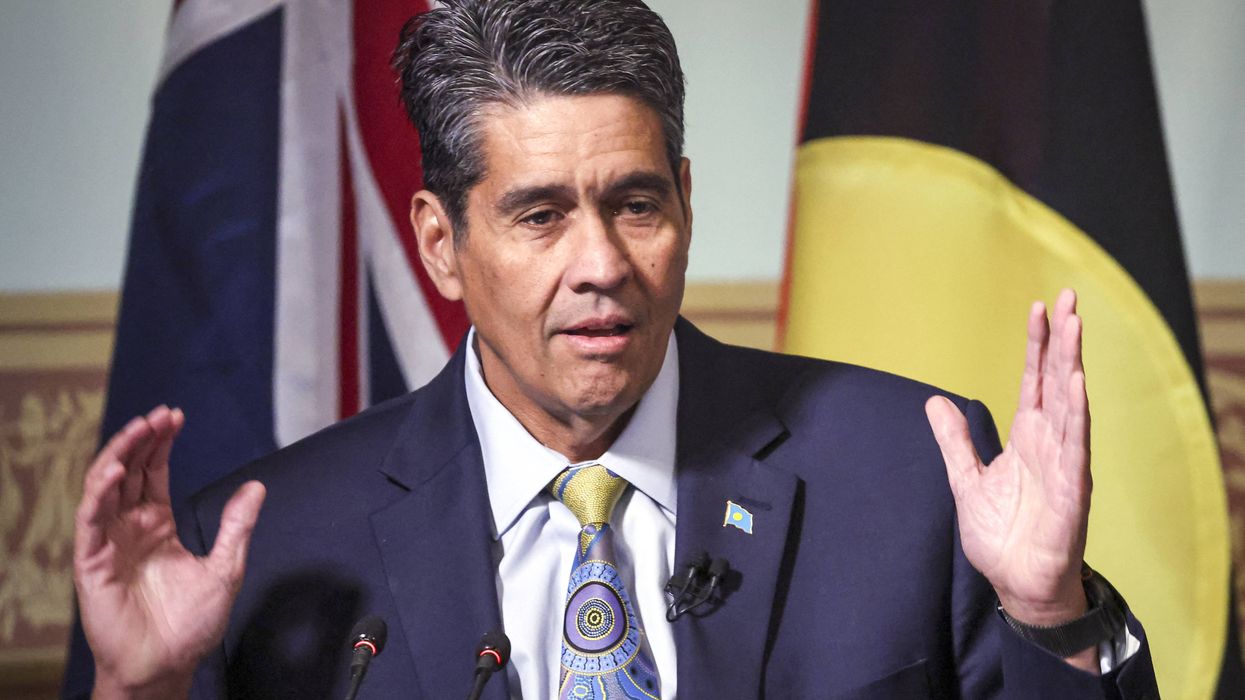November, 22 2022, 12:13pm EDT

For Immediate Release
Contact:
Perry Wheeler, Earthjustice, 202-792-6211, pwheeler@earthjustice.org
Erik Molvar, Western Watersheds Project, 307-399-7910, emolvar@westernwatersheds.org
Stephen Bloch, Southern Utah Wilderness Alliance, 801-428-3981, steve@suwa.org
Conservation Groups Intervene to Protect Utah Monuments, Antiquities Act
WASHINGTON
Conservation groups filed a motion to intervene in two lawsuits challenging President Biden's restoration of Bears Ears and Grand Staircase-Escalante National Monuments today. The suits, led by the state of Utah, also attack the Antiquities Act itself as unlawful. Nearly five years ago, former President Trump controversially -- and without lawful authority -- shrunk the boundaries of Bears Ears by 85% and Grand Staircase-Escalante by 47%, stripping protection for world-renowned dinosaur fossils, remarkable geologic features, and important Native American cultural sites.
The Hopi Tribe, Navajo Nation, Ute Mountain Ute Tribe, and the Pueblo of Zuni also moved to intervene in the suits last week.
"These lawsuits seek to destroy the Antiquities Act with a flawed argument that presidents may only designate small monuments," said Heidi McIntosh, Earthjustice managing attorney representing the conservation groups. "The Supreme Court has recognized for one hundred years that the Antiquities Act gives the president broad authority to designate national monuments commensurate in size to the 'objects' that need protection. Lower courts have consistently followed suit. Without the Antiquities Act, we would not have some of our most beloved national parks, including Grand Canyon, Grand Teton, Olympic, Zion, and Acadia. We will fight alongside our partners and clients to ensure the Antiquities Act is preserved for future generations to experience our most beloved and historic places."
In 1920, the Supreme Court upheld President Teddy Roosevelt's use of the Antiquities Act to protect 800,000 acres in Arizona when he declared the Grand Canyon a national monument. Presidents since have routinely designated monuments of a million acres or more. Courts have consistently found that culturally and scientifically rich landscapes, even large ones, are eligible for protection under the Act. In their motion to intervene, the conservation groups signaled their opposition to Utah's erroneous claim that a president can designate only small monuments centered on specific sites.
"The State of Utah tried essentially this exact same lawsuit in 2004 against Grand Staircase-Escalante National Monument, represented by none other than William Perry Pendley, and the judge handed them a decisive defeat," said Erik Molvar, executive director of Western Watersheds Project. "Bears Ears and Grand Staircase-Escalante are so packed with Indigenous cultural sites, fossil deposits, and scientifically important ecological features that it is beyond question that the President has the authority to protect these lands under the Antiquities Act for the benefit of all Americans."
"Utahns and Americans overwhelmingly support national monument protections for Bears Ears and Grand Staircase-Escalante, but that hasn't stopped Utah's attorney general and governor from trying to destroy both of these monuments and the law that makes it possible for presidents to create national monuments," said Tim Peterson, Cultural Landscapes director for the Grand Canyon Trust. "State leaders claim to value natural heritage and love the outdoors, but this lawsuit says otherwise."
"The remarkable Grand Staircase-Escalante and Bears Ears national monuments are the crown jewels of America's public lands," said Stephen Bloch, legal director for the Southern Utah Wilderness Alliance. "It's terribly disappointing that, rather than embrace these monuments as the very best our state has to offer the world, Utah Governor Cox has attacked them and hopes to see the monuments undone. We're going to work to stop that from happening. Without the protections that come with being preserved as national monuments, the sacred sites, fossils, and ecosystems found within are at risk of being lost forever to reckless off-road vehicle use, wildcat mining and drilling, and rampant tourism."
Conservation groups, along with Tribes who urged the Obama administration to establish the Bears Ears National Monument, previously challenged President Trump's 2017 dismantling of the monuments. That case remains pending in the District of Columbia.
"This radical effort to dismantle the Antiquities Act and revoke protections for the Bears Ears and Grand Staircase-Escalante National Monuments defies the overwhelming public support for protecting these cherished lands, contradicts more than a century of settled law, and ignores the immense scientific and cultural values throughout these landscapes," said Jamie Williams, president of The Wilderness Society. "We look forward to working with Tribal governments and our partners to ensure these grand national monuments remain protected and cherished for generations to come."
"Bears Ears and Grand Staircase-Escalante are national treasures," said Sharon Buccino, senior attorney with the Natural Resources Defense Council. "They protect irreplaceable cultural sites, scientific resources, and natural areas that are key to our survival as the climate changes. President Biden needed to protect them and had the authority to do so."
"These efforts are blatant attempts to undermine the Antiquities Act and those who have fought for nearly 120 years to defend this critical conservation law and all it safeguards," said Theresa Pierno, president and CEO for National Parks Conservation Association. "National parks like Acadia and the Grand Canyon were protected because of this vital law. Bears Ears and Grand Staircase-Escalante National Monuments are no different. They are sacred, living landscapes for many Indigenous Tribes and hold extraordinary archaeological and cultural resources that tell the stories of our shared history and heritage. Millions of people have spoken out in support of protecting these treasured places, and this last-ditch effort to disregard those voices will not prevail."
Bears Ears National Monument is home to ancient cliff dwellings, over 100,000 Native American cultural sites, innumerable historic landmarks, and iconic wildlife such as bears, bighorn sheep, and mountain lions. Tribes continue to visit the lands to hold ceremonies and connect with their ancestors. The monument designation included a historic plan for co-management of this unique landscape by federal agencies and the five Tribes with sacred cultural interests in the lands.
Grand Staircase-Escalante is often described as a "dinosaur Shangri-la," as it is home to dinosaur fossils not found anywhere else in the world. It was established as a national monument in 1996 and in the two decades since it was protected, paleontologists have unearthed fossils from 21 previously undiscovered dinosaur species.
"Utah leaders remain shortsighted. Our state is facing extraordinary challenges regarding climate and growth, and communities bear the burden," said Carly Ferro, Sierra Club Utah Chapter Director. "State leaders' most recent attempt to undermine public lands seeks to dismantle unparalleled landscapes that drive incredible economic value for Utah while nurturing critical cultural and ecological resources. We have and will continue to defend against the state's efforts to disparage the Antiquities Act state-side and federally. Bears Ears and Grand-Staircase National Monuments will persevere. We look forward to continuing collaborations to protect these monuments and continue to bring opportunities to ensure a healthy future for everyone here in Utah."
"Bears Ears and Grand Staircase-Escalante National Monuments must stay fully intact to preserve the extensive cultural, scientific, and natural features they hold," said Sara Husby, executive director for Great Old Broads for Wilderness. "These monuments exemplify the intended use of the Antiquities Act to protect our country's rich heritage. The Act is a critical conservation tool, and the attempts by Utah officials to weaken it must be stopped."
"At root, Utah believes that it, rather than the federal government, should be managing Bears Ears, Grand Staircase-Escalante, and all other public lands in the state," said Chris Krupp of WildEarth Guardians. "Its lawsuit is intended to chip away at the fundamental principle that all Americans get to determine how public lands are managed. If Utah were to manage these places, profit-driven resource exploitation would take precedence over conservation and protection."
"It's beyond disappointing that Utah leaders want to gut one of the most important and popular conservation laws ever passed by Congress," said Randi Spivak, director of the Center for Biological Diversity's public lands program. "Two-thirds of Utahn's strongly support creating new national monuments, parks and wildlife refuges and 60% agree protecting Bears Ears is good for the state. We're fighting this reckless lawsuit because the law is clear. A monument should be as large as it needs to be to protect whatever needs protection."
Earthjustice represents The Wilderness Society, Grand Canyon Trust, WildEarth Guardians, Western Watersheds Project, Sierra Club, Center for Biological Diversity, National Parks Conservation Association, and Great Old Broads for Wilderness in the intervention. They are co-counseling with the Natural Resources Defense Council and the Southern Utah Wilderness Alliance.
Photos of Grand Staircase-Escalante and Bears Ears National Monuments are available here.
The motion to intervene for both suits can be found here and here.
Additional information on the Tribes' work to protect Bears Ears is available here. Media requests on the Tribes' efforts can be directed to media@narf.org.
Western Watersheds Project is an environmental conservation group working to protect and restore watersheds and wildlife through.
LATEST NEWS
'Unhinged' Trump Wishes 'Merry Christmas to All, Including the Radical Left Scum'
"Nothing more Christian than to be a hateful wretched fuck on Jesus’ birthday," quipped one critic.
Dec 25, 2025
In a message called typically on-brand by observers, US President Donald Trump wished "Merry Christmas to all"—including his political opponents, whom he described in decidedly unchristlike language.
"Merry Christmas to all, including the Radical Left Scum that is doing everything possible to destroy our Country, but are failing badly," Trump said Christmas Eve on his Truth Social network.
"We no longer have Open Borders, Men in Women’s Sports, Transgender for Everyone, or Weak Law Enforcement," the president added. "What we do have is a Record Stock Market and 401K’s, Lowest Crime numbers in decades, No Inflation, and yesterday, a 4.3 GDP, two points better than expected. Tariffs have given us Trillions of Dollars in Growth and Prosperity, and the strongest National Security we have ever had. We are respected again, perhaps like never before. God Bless America!!!"
While nothing new—Trump has used past Christmas messages to tell people he doesn't like to "go to hell" and "rot in hell"—observers, including some MAGA supporters, were still left shaking their heads.
"Radical Left Scum" 😂🤣😂🤣😂🤣Christmas greetings from a liar, traitor, pedophile, and overall shitstain upon society.
[image or embed]
— Bill Madden (@maddenifico.bsky.social) December 24, 2025 at 9:00 PM
"Nothing more Christian than to be a hateful wretched fuck on Jesus’ birthday!" liberal political commentator Dean Withers said on X.
Another popular X account posted: "A sitting president of the United States using Christmas Day to spew venom at fellow Americans he calls 'Radical Left Scum' isn’t just unpresidential—it’s unhinged, un-Christian, and utterly beneath the office."
"This is the behavior of a bitter, small man who can’t even pretend to unify for one holy day," she added. "Shameful. Disgraceful. Pathetic."
Keep ReadingShow Less
Palau Signs Controversial $7.5 Million Deal to Take 75 Trump Deportees
"What if we spent the $100,000 per person in America setting them up with housing assistance, healthcare, education, etc?" asked one critic.
Dec 25, 2025
Palau said Wednesday that it has agreed to take in up to 75 people deported from the United States during President Donald Trump's purge of unauthorized immigrants in exchange for millions of dollars in financial assistance—a move that has sparked considerable opposition among the Pacific archipelago nation's roughly 18,000 inhabitants.
The office of Palauan President Surangel Whipps Jr. announced a memorandum of understanding with the United States under which the country will receive $7.5 million in assistance in exchange for taking in 75 third-country deportees who cannot be repatriated to their countries of origin.
Earlier this week, US State Department Principal Deputy Spokesperson Tommy Pigott said the people who will be sent to Palau have “no known criminal histories," as is the case with the vast majority of unauthorized immigrants in the United States, who have committed no crime other than the mere misdemeanor of entering the country illegally.
However, Palauans have voiced concerns over US Secretary of State Marco Rubio's remarks during a Cabinet meeting earlier this year in which he said that, “We want to send some of the most despicable human beings—perverts, pedophiles, and child rapists—to your countries as a favor to us."
Whipps said Wednesday that the relocation plan involves “people seeking safety and stability."
“These are not criminals,” the president said during earlier debate on the proposal. “Their only offense was entering the United States illegally and working without proper permits.”
However, Palau's Congress and its influential Council of Chiefs have twice rejected the transfers.
Piggot's statement "highlighted US commitments to partner with Palau on strengthening the country’s healthcare infrastructure, increasing Palau’s capacity to combat transnational crime and drug trafficking, and bolstering Palau’s civil service pension system."
Palau, which was administered by the US from 1947-94 and is now associated with the United States under the 1994 Compact of Free Association, which guaranteed the country nearly $900 million economic aid over 20 years in exchange for exclusive US military access.
The country's foreign policy often tracks closely to that of the US. For example, Palau is sometimes among the handful of usually similarly small nations that vote along with the United States and Israel against United Nations resolutions condemning Israeli crimes or affirming Palestinian rights.
Other developing nations including Eswatini, Rwanda, South Sudan, and Uganda have also agreed to take in US deportees or are considering doing so.
Reactions to the US-Palau agreement drew criticism on social media, where one X user called the deal a "bribe" and another popular Bluesky account asked, "What if we spent the $100,000 per person in America setting them up with housing assistance, healthcare, education, etc?"
Keep ReadingShow Less
Trump 'Choosing From the War Crimes Menu' With 'Quarantine' on Venezuela Oil Exports
"Economic strangulation is warfare and civilians always pay the price," lamented CodePink.
Dec 25, 2025
President Donald Trump has ordered US military forces to further escalate their aggression against Venezuela by enforcing a "quarantine" on the South American nation's oil—by far its main export—in what one peace group called an attempted act of "economic strangulation."
"While military options still exist, the focus is to first use economic pressure by enforcing sanctions to reach the outcome the White House is looking [for]," a US official, who spoke on condition of anonymity, told Reuters.
The move follows the deployment of an armada of US warships and thousands of troops to the region, threats to invade Venezuela, oil tanker seizures off the Venezuelan coast, Trump's authorization of covert CIA action against the socialist government of Venezuelan President Nicolás Maduro, and airstrikes against boats allegedly running drugs in the Caribbean Sea and Pacific Ocean that have killed more than 100 people in what critics say are murders and likely war crimes.
This, atop existing economic sanctions that experts say have killed tens of thousands of Venezuelans since they were first imposed during the first Trump administration in 2017.
"The efforts so far have put tremendous pressure on Maduro, and the belief is that by late January, Venezuela will be facing an economic calamity unless it agrees to make significant concessions to the US," the official told Reuters.
The official's use of the word "quarantine" evoked the 1962 Cuban Missile Crisis, an existential standoff that occurred after the John F. Kennedy administration imposed a naval blockade around Cuba to prevent Soviet nuclear missiles from being deployed on the island, even as the US was surrounding the Soviet Union with nuclear weapons.
"This is an illegal blockade," the women-led peace group CodePink said in response to the Reuters report. "Calling it a 'quarantine' doesn’t change the reality. The US regime is using hunger as a weapon of war to force regime change in Venezuela. Economic strangulation is warfare and civilians always pay the price. The US is a regime of terror."
Critics have also compared Trump's aggression to the George W. Bush administration's buildup to the invasion and occupation of Iraq, initially referred to as Operation Iraqi Liberation (OIL). But unlike Bush, Trump—who derided Bush for not seizing Iraq's petroleum resources as spoils of war—has openly acknowledged his desire to take Venezuela's oil.
"Maybe we will sell it, maybe we will keep it,” he Trump said on Monday. “Maybe we’ll use it in the strategic reserves. We’re keeping the ships also.”
On Wednesday, a panel of United Nations experts said that the US blockade and boat strikes constitute "illegal armed aggression" against Venezuela.
Multiple efforts by US lawmakers—mostly Democrats, but also a handful of anti-war Republicans—to pass a war powers resolution blocking the Trump administration from bombing boats or attacking Venezuela have failed.
The blockade and vessel seizures have paralyzed Venezuela's oil exports. Ports are clogged with full tankers whose operators are fearful of entering international waters. Venezuela-bound tankers have also turned back for fear of seizure. Although Venezuelan military vessels are accompanying tankers, the escorts stop once the ships reach international waters.
According to the New York Times, Venezuela is considering putting armed troops aboard tankers bound for China, which, along with Russia, has pledged its support—but little more—for Caracas.
Keep ReadingShow Less
Most Popular


